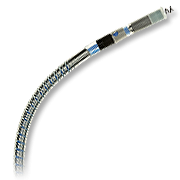
June 25, 2012 — St. Jude Medical Inc. today commented on the Durata lead failure reported in the MAUDE database report submitted to the U.S. Food and Drug Administration (FDA) May 2.
Through the company's investigation of the MAUDE database report and information provided to the company by the FDA, including model number, implant and event dates, St. Jude Medical identified a single Durata lead that matches the available information. The FDA has confirmed that the serial number of this lead matches the serial number from the MAUDE report.
"Our analysis of the lead indicates it was damaged due to external abrasion, which is not the same as the inside-out abrasion that has been seen in our previous generation Riata leads," the company said. "Simultaneous to this announcement, the company has submitted a medical device report (MDR) to the FDA with our additional findings."
The identified lead was explanted at a Florida hospital and was provided to St. Jude with static and dynamic fluoroscopy and photographs of the extracted lead. The hospital also allowed the company to inspect the lead at the hospital.
"Through our investigation, we have identified that the patient had an additional defibrillation lead that had been capped (and was no longer being used). In the fluoroscopic images, the two leads cross in the region mentioned in the filed MAUDE report," the company said. "Based upon physical examination, our analysis indicates the damage to the Durata lead is consistent with external abrasion from contact with a calcified, or hardened, heart valve or possibly from lead-to-lead contact. External abrasion is a known cause of failure across all cardiac leads in the industry, which is different from the inside-out abrasion seen with externalized conductors observed in some Riata leads."
"We recognize the importance of providing physicians with up-to-date and accurate information in a timely and responsible manner so that they can make informed patient care decisions. This case highlights the importance of appropriate analysis in determining the root cause of lead damage. It is our desire to work closely with physicians to understand the circumstances surrounding a device malfunction. We encourage physicians to report any case of lead failure to the manufacturer for further inspection and analysis to best ensure we are able to validate and communicate information in the interest of patient safety," St. Jude Medical said in its statement.
For more information: www.sjm.com


 January 05, 2026
January 05, 2026 









